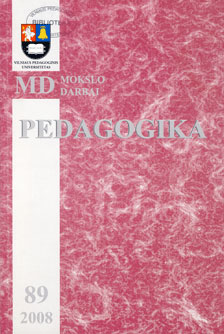Dalykinės kalbos gebėjimų ugdymo teorinės prielaidos aukštosiose mokyklose: universitetų ir kolegijų lietuvių kalbos kultūros programų analizė
Theoretical premises for the development of professional language skills at higher schools: analysis of programs on the Lithuanian language usage...
Author(s): Vilija SalienėSubject(s): Education
Published by: Vytauto Didžiojo Universitetas
Keywords: langue usage; professional phraseology; competencies.
Summary/Abstract: The course on the Lithuanian language usage and professional phraseology at universities and colleges, one of constituent parts of the curriculum, should be very important for preparing specialists seeking to preserve the national identity and the lithuanian language on the one hand. On the other hand, a trend is observed that among the requirements for employment, employers indicate a good command of foreign language and do not emphasize the official language proficiency. If there is no need to know the Lithuanian language, efficiency of the course on the Lithuanian language usage and professional phraseology may be at risk at higher schools. At the order of the ministry of education and science of the republic of Lithuania a survey was conducted on the peculiarities of the Lithuanian language usage at higher schools. One of the objectives of this survey was to analyze how courses on the language usage and professional phraseology are conducted at universities and colleges, to what extent the materials delivered comply with modern needs of a young person and market demands. Materials were submitted for analysis by the lithuanian university of agriculture, vilnius university, lithuanian academy of physical education, lithuanian veterinary academy, vilnius pedagogical university, kaunas academy of medicine, alytus college, lithuanian marine college, marijampolė college, vilnius college of construction and design, žemaitijos college, panevėžys college, klaipėda business college. Programs were analyzed in several aspects, including goals of the course, workload (in credits), testing, structure, and content. The survey conducted was the only one such type survey in lithuania therefore its data could be used for putting forward recommendations to higher schools, also for modelling new courses or improving their training process. The goal of this article is to analyze the content of the course on language usage (professional phraseology) and to foresee possibilities for its improvements. the object of the survey was programs of six universities and seven higher schools on language usage (professional phraseology). Hypothesis of the survey- the content of the course on language usage (professional phraseology) was considered to comply with the needs of a young person as well as to the training of abilities necessary for finding a foothold in a particular social environment, and not to duplicate the course of the secondary school. It was also expected that apart from the development of correctness of language skills special attention was devoted to the training of competencies in communicating verbally and in writing. Survey methods - questionnaire (interviewing), analytic descriptive, comparative, generalising.
Journal: Pedagogika
- Issue Year: 2008
- Issue No: 89
- Page Range: 82-89
- Page Count: 7
- Language: Lithuanian

